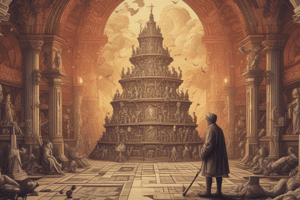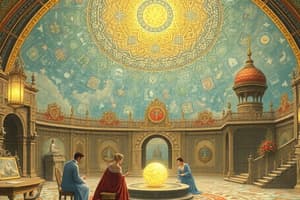Podcast
Questions and Answers
What was the basis for the Scientific Method promoted during the Scientific Revolution?
What was the basis for the Scientific Method promoted during the Scientific Revolution?
- Empiricism (correct)
- Faith-based reasoning
- Rational thinking
- Rationalism
Which scientist suggested that natural laws, such as gravity, determined how the universe worked?
Which scientist suggested that natural laws, such as gravity, determined how the universe worked?
- Isaac Newton (correct)
- Johannes Kepler
- Nicolas Copernicus
- Galileo Galilei
What was the goal of the Enlightenment?
What was the goal of the Enlightenment?
- To apply reason and the scientific method to social, political, and economic problems (correct)
- To question the authority of the church
- To spread the idea of rationalism
- To promote the idea of empiricism
Which philosopher defined the idea of the social contract?
Which philosopher defined the idea of the social contract?
What was the outcome of the English Civil War?
What was the outcome of the English Civil War?
What was a key feature of the worldview that emerged from the Scientific Revolution?
What was a key feature of the worldview that emerged from the Scientific Revolution?
Which of the following was NOT a key figure of the Enlightenment?
Which of the following was NOT a key figure of the Enlightenment?
What was the significance of the ideas of the philosophes?
What was the significance of the ideas of the philosophes?
What was the main intention behind the change in the law concerning imprisonment?
What was the main intention behind the change in the law concerning imprisonment?
What was Charles II's approach to politics and society?
What was Charles II's approach to politics and society?
What was Cromwell's fate after his death?
What was Cromwell's fate after his death?
What was the outcome of the English Civil War in England?
What was the outcome of the English Civil War in England?
What was the primary reason for the colonization of the American continents?
What was the primary reason for the colonization of the American continents?
Why did Charles II secretly agree with King Louis XIV of France?
Why did Charles II secretly agree with King Louis XIV of France?
What was the main division within Parliament during James II's rule?
What was the main division within Parliament during James II's rule?
What was the outcome of the shift in power in England from 1625 to 1688?
What was the outcome of the shift in power in England from 1625 to 1688?
What was the main characteristic of the social contract before the English Civil War?
What was the main characteristic of the social contract before the English Civil War?
What was the main difference between the Whigs and the Tories?
What was the main difference between the Whigs and the Tories?
Which European power gained control over the east coast of what is today the United States of America?
Which European power gained control over the east coast of what is today the United States of America?
What was the significance of the Whigs and Tories?
What was the significance of the Whigs and Tories?
What was the original connotation of the words 'Whig' and 'Tory'?
What was the original connotation of the words 'Whig' and 'Tory'?
What is the term for the policy or practice of establishing and maintaining colonies?
What is the term for the policy or practice of establishing and maintaining colonies?
What was the name of the war that led to upheaval in the colonies?
What was the name of the war that led to upheaval in the colonies?
What was founded on the U.S. Constitution?
What was founded on the U.S. Constitution?
What was the motivation behind Parliament's plot to overthrow King James II?
What was the motivation behind Parliament's plot to overthrow King James II?
Who invited William of Orange to take over the country?
Who invited William of Orange to take over the country?
What was the outcome of William of Orange's march towards London?
What was the outcome of William of Orange's march towards London?
What was the significance of the Bill of Rights written in 1689?
What was the significance of the Bill of Rights written in 1689?
What was the consequence of King James II's actions?
What was the consequence of King James II's actions?
What was the result of the Glorious Revolution?
What was the result of the Glorious Revolution?
What was the relationship between King William III and Queen Mary II?
What was the relationship between King William III and Queen Mary II?
What was the significance of the term 'Tories' in the context of the Conservative Party of Canada?
What was the significance of the term 'Tories' in the context of the Conservative Party of Canada?
What was the outcome of the Seven Years' War for France?
What was the outcome of the Seven Years' War for France?
What was a major factor contributing to France's debt by the time King Louis XVI became king?
What was a major factor contributing to France's debt by the time King Louis XVI became king?
What was a characteristic of Louis XVI's leadership style?
What was a characteristic of Louis XVI's leadership style?
What was a major criticism of Marie Antoinette?
What was a major criticism of Marie Antoinette?
What was the relationship between Austria and France?
What was the relationship between Austria and France?
What was a consequence of Louis XV's rule?
What was a consequence of Louis XV's rule?
Why did Louis XVI's advisors have limited influence over him?
Why did Louis XVI's advisors have limited influence over him?
What was a characteristic of the French monarchy under Louis XVI?
What was a characteristic of the French monarchy under Louis XVI?
Flashcards are hidden until you start studying
Study Notes
The Scientific Revolution
- Promoted the idea of Empiricism, or observation, as a basis for the Scientific Method
- Changed the basic view of the universe, confirming that the Earth rotates around the sun
- Led to a more secular, scientific worldview in Europe based on rationalism
- Founded on a belief in rationalism and the need to question existing beliefs
Key Figures
- Nicholas Copernicus: confirmed that the Earth rotates around the sun
- Johannes Kepler: contributed to the understanding of the universe
- Galileo Galilei: confirmed that the Earth rotates around the sun
- Isaac Newton: suggested that natural laws, such as gravity, determine how the universe works
- John Locke: had a different view of how a government should operate
- Thomas Hobbes: had a different view of how a government should operate
- Voltaire, Montesquieu, and Rousseau: exchanged ideas about government, freedom, equality, and natural law
- Rousseau: defined the idea of the social contract, in which people must give up some freedom to receive the benefits of living together in a community with other humans
The Enlightenment
- An attempt to improve society by applying reason and the scientific method to social, political, and economic problems
- Founded on a belief in rationalism and the need to question existing beliefs
Revolution in England
- Before the Civil War, Parliament had little power
- The Stuart Dynasty ended with the execution of Charles I
- Oliver Cromwell became the Lord Protector of England
- Charles II tried to steer England down the middle path in both politics and society
- The Glorious Revolution of 1688 restored a limited monarchy
The Glorious Revolution
- Parliament plotted to overthrow James II, who had become too powerful
- William of Orange and his wife Mary were invited to take over the country
- James II abdicated and was exiled to France
- William of Orange became King William III of England, and his wife became Queen Mary II
- A Bill of Rights was written in 1689 to limit the power of the monarchy
- The Bill of Rights recognized the support Parliament gave to the new government and granted more power to the people
The American Revolutionary War
- Britain had established thirteen colonies in British North America
- The Seven Years' War led to upheaval in the colonies
- The colonists were unhappy with Mercantilism and taxation
- The colonists protested the Intolerable Acts
- The Thirteen Colonies declared independence
- The French sent troops to fight with the American revolutionaries
- American democracy was founded on the U.S. Constitution
Key Terms and Concepts
- Colonization: the policy or practice of establishing and maintaining colonies
- Mercantilism: an economic theory that a country's prosperity depends on its accumulation of gold and silver
- Democracy: a system of government in which power is held by the people, either directly or through elected representatives
Studying That Suits You
Use AI to generate personalized quizzes and flashcards to suit your learning preferences.




